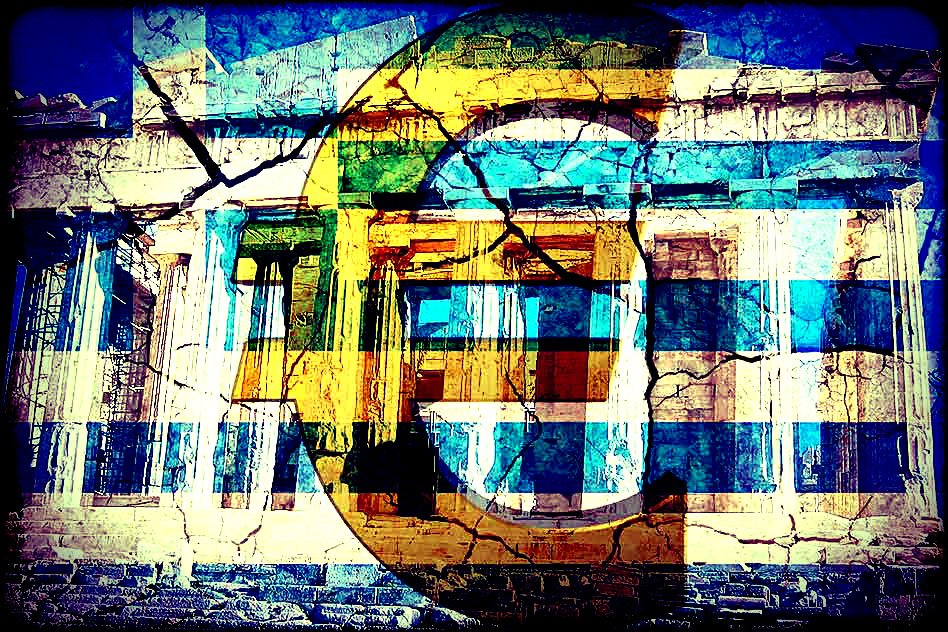For many months now the European Debt Crisis – specifically the Greek crisis – has made headlines around the world. This article tries to explain in simple terms how Greece found itself in this mess.
What do “Euro”, “EU” & “Eurozone” mean?
Throughout history, European countries were always at war with each other. After the Second World War, Europe was in ruins, its economy in shambles, and its political authority in the world diminished.
European countries realized that to survive in the post-War world with stability and relevance they could not afford more wars. For this, they had to find a way to come together and resolve differences. This led to the formation of the European Union (EU).
In the historic Schuman Declaration of 1950, European leaders declared that peace can be achieved only through economic integration. Basically, countries that traded with each other would be less likely to fight with each other.
To make business easier, a common currency was introduced – the Euro. Countries which adopted the Euro formed the Eurozone; these countries abandoned their former currencies and allowed the newly formed European Central Bank (ECB) to make economic policies.
What is the main cause of the crisis?
The ECB was empowered to make only monetary policies.
And that’s the core of the problem Europe faces: the ECB made monetary policies (meaning, how much money is there in the market and what the interest rates will be) while member states continued to make fiscal policies (meaning, how much a government will collect, borrow and spend the money).
How did Greece get into this mess?
After the creation of the ECB, countries like Greece could now borrow large amounts of money at very low-interest rates. Interest rates for loans to smaller European countries which were previously above 20% became less than 5%.
Greece began to borrow recklessly – primarily so politicians could use it for populist programmes like high pensions, low taxes, higher salaries etc. This led to increasing government debt – which Greece managed to repay with EVEN MORE borrowed money.
When did the crisis finally hit Greece & other countries?
This cycle continued until 2008 when the US housing market suffered a collapse and the globe became engulfed in the largest financial crisis since the Great Depression in 1929. The world experienced an acute credit crisis, and borrowing stopped. Greece couldn’t borrow anymore, couldn’t repay its debts – and Europe suddenly realized the mountainous magnitude of the Greek debt: 175% of the country’s GDP, the largest sovereign debt in HISTORY.
Greece couldn’t repay its debt nor could it pay for all the new jobs and social measures it had unwisely created. This led to a spike in unemployment, a crisis of confidence, decrease in foreign investment, and political uncertainty. And because of this the entire Eurozone suffered heavily.
How did Europe react to the crisis?
To help Greece pay up its debts (which it owed to the ECB, the IMF, various banks and other EU countries), Germany and other countries agreed to provide it with bailouts – meaning Germany would pay Greece’s bills.
But under one condition – Greece had to agree to certain austerity measures.
Austerity measures meant that the Greek government would have to cut spending, raise taxes, limit budgets and borrow less in the future so that such an incident never happened again. This is hugely unpopular in Greece and has led to unemployment and austerity riots.
Greece has received 2 major bailouts till now, and both involved severe austerity measures. But Greece is still in debt and has been unable to repay the bailouts. This week it became the first developed country to default on a bailout.
What if Greece goes bankrupt?
If this continues, Greece could default (meaning, be declared bankrupt). Normally, a small country like Greece defaulting wouldn’t cause international concern. But because of the Eurozone, if Greece defaults, Spain or Ireland could be next. Then Italy, then Portugal, France and then Germany – and with that the entire world will be dragged into the major economic crisis. This could lead to civil unrest; political instability and possibly warfare (remember how the Great Depression in Europe led to the rise of Nazism?).
What is the ‘Greek referendum’ all about?
Greece has sought an extension to repay its bailout. Germany & the IMF have agreed but have imposed more austerity measures. On 5 July, the Greek people will participate in a national referendum to decide whether to accept or decline these conditions. They could:
• Accept austerity measures. Then, ruling party Syriza will be weakened; GDP will fall, profits will disappear, but Greece might just be able to survive the crisis.
• Reject austerity measures. No more budget cuts, but this will lead to deepening of crisis and Greece could exit the Eurozone and even the EU. Worst case scenario: Greece defaults, world plunges into crisis.
In the next few days Greece will be the centre of the universe; the international spotlight will be focussed on the Greek people. How will they vote?
The future of Europe – and the world – hangs delicately in balance











